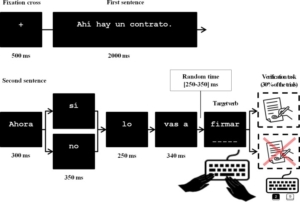Negation markers inhibit motor routines during typing of manual action verbs
Cognition
García-Marco, E., Morera, Y., Beltrán, D., de Vega, M., Herrera, E., Sedeño, L., Ibáñez, A. & García, A. M. (2019). Negation markers inhibit motor routines during typing of manual action verbs. Cognition 182, 286-293. Online: https://bit.ly/2Oi7ITd.
En este estudio investigamos la relación entre la negación lingüística y la inhibición motora. Específicamente, mediante una tarea original de escritura al teclado, mostramos que la presencia de un marcador de negación (p. ej., Ahí está la carta; ahora NO la firmarás) extiende selectivamente el tiempo necesario para copiar el último verbo, siempre y cuando este describa acciones manuales. Concluimos así que la negación inhibe los movimientos realizados con la misma parte del cuerpo que describen los verbos negados (a saber, las manos). Este hallazgo ofrece nuevas perspectivas sobre la base cognitiva de la negación lingüística.
Podés leer el artículo completo haciendo click AQUÍ
Negation markers inhibit motor routines during typing of manual action verbs
Cognition
García-Marco, E., Morera, Y., Beltrán, D., de Vega, M., Herrera, E., Sedeño, L., Ibáñez, A. & García, A. M. (2019). Negation markers inhibit motor routines during typing of manual action verbs. Cognition 182, 286-293. Online: https://bit.ly/2Oi7ITd.
We explored whether negation markers recruit inhibitory mechanisms during keyboard-based action-verb typing. In each trial, participants read two sentences: the first featured a context (There is a contract) and the second ended with a relevant verb which had to be immediately typed. Crucially, the verb could describe manual actions, non-manual actions or non-motor processes, with either affirmative (You do sign it) or negative (You don’t sign it) polarity. We assessed the impact of verb type and polarity on two typing dimensions: motor programming (lapse between target onset and first keystroke) and motor execution (lapse between first and last keystroke). Negation yielded no effect on motor planning, but it selectively delayed typing execution for manual-action verbs, irrespective of the subjects’ typing skills. This suggests that processing negations during comprehension of manual-action sentences recruits inhibitory mechanisms acting on same-effector movements. Our novel finding extends embodied models of language and effector-specific motor-language integration.
To access the full paper please click here



